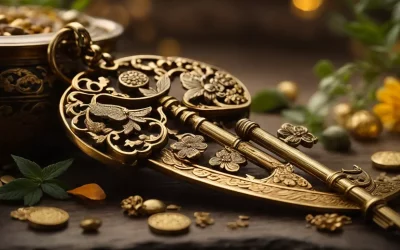Dive into the ancient wisdom of Traditional Chinese Medicine as we explore the Water Element, a crucial component in this holistic healing practice. Uncover its symbolism, its connection to the yin energy and acupuncture, and its role in maintaining vitality and health. So what is the water element? Let’s shed light on this fascinating aspect of TCM.
The Water Element in Traditional Chinese Medicine represents the kidney and bladder, symbolizing life’s essence and vitality. It’s linked to yin energy, and acupuncture practices, and is essential for maintaining health.
Curious about how the Water Element influences your health and vitality? Continue reading to delve deeper into this fascinating aspect of Traditional Chinese Medicine and its profound impact on your well-being.
- Linking Kidneys and Bladder to Water Element
- The Salty Taste: Its Significance in Water Element
- Identifying Deficiency or Excess in the Water Element
- Seasonality and Emotions Related to Water Element
- Water Element’s Association with Bone Tissue
- Water Element’s Influence on Personalities in TCM
- Wrapping Up the Water Element
Linking Kidneys and Bladder to Water Element
In the world of Traditional Chinese Medicine (TCM), the kidneys and bladder are part of the water element, an archetype of life’s season. They’re like two buddies, embodying the water personality, working together in each season to keep life and the water type flowing right in our bodies.
Kidneys: The Powerhouse of Water Energy
The kidneys? They’re the powerhouse behind this whole thing. They control the flow of life fluids like water type in our body, keeping everything balanced. When they’re healthy, they operate like a well-oiled machine of life, making sure fluids of various types flow smoothly through our organ systems.
- Focus on care: Keeping your kidneys healthy is crucial for optimal water energy flow and a better type of life.
- In the journey of life, watch your back: In TCM, kidneys, a vital type of organ, relate to the lower back and knees. So if you’ve got issues there, it might be a sign your kidney health isn’t up to par.
Bladder: The Pathway for Fluids
The bladder’s job? It’s all about the storage and elimination of those fluids. Think of the meridians system as a path that directs the fluid where it needs to go.
- Meridians matter: In TCM, bladder meridians run down the back part of our body – from head to ankles.
- Visionary organ: Interestingly enough, bladder health can even affect vision according to TCM!
In Traditional Chinese Medicine, it’s crucial to keep your bladder and kidneys healthy. Why? Because they are vital in keeping our body’s water element in balance. So, make sure to take proper care of these organs.
The Salty Taste: Its Significance in Water Element
Ever wondered why you crave salty foods? It could be your body signaling a water element imbalance in traditional Chinese medicine.
Water Imbalance and Salt Cravings
Craving salt is often linked to the water element. Here’s how:
- A strong preference for salty taste might mean your body’s water energy is off-kilter.
- Consuming too many salty foods can further disturb this balance, leading to health issues.
Moderate salt intake, though, plays a vital role in maintaining the equilibrium of the water element.
Excessive Salt Intake: A Double-Edged Sword
Excessive consumption of salt can have negative effects on the water element:
- It may lead to conditions like hypertension and kidney disease.
- Over time, it can cause a severe imbalance in the body’s water energy.
So, while salt is necessary for our bodies, too much of it can tip the scales unfavorably.
Balancing Act: Moderate Salt Consumption
However, don’t swear off salt just yet! Moderate consumption of this mineral is crucial for balancing water energy. Here are some points to consider:
- Including an appropriate amount of salt in your diet helps maintain fluid balance.
- Certain foods naturally rich in sodium – like celery or beetroot – can contribute positively to your overall health while keeping your water element balanced.
Identifying Deficiency or Excess in the Water Element
Spotting Imbalance Symptoms
Water imbalance? Look for these signs:
- Fatigue
- Excess fear
- Lack of resistance
These symptoms suggest a maladapted water element.
Physical Manifestations
Water imbalance doesn’t just affect wellness. It also shows up physically:
- Weakness
- Power loss
- Strength reduction
Diagnostic Methods
TCM practitioners use these methods to identify imbalances:
- Observation: Checking physical conditions.
- Listening/Smelling: Assessing voice, breath, and body odors.
- Inquiry: Asking about symptoms, lifestyle, and diet.
- Palpation: Feeling pulse, and pressure points.
Remember, balance is key in TCM philosophy.
Tools for Balance Restoration
Regain your balance with these resources:
- Supplements: Enhance strength and power.
- Journaling: Track symptoms and progress.
- Reading: Learn more about TCM principles.
Balance restoration isn’t instant; it takes work and consistency.
In addition to external resources, internal conservation plays a huge role in restoring balance. Embrace the whole journey towards wellness!
Seasonality and Emotions Related to Water Element
 Winter: The Water Phase Season
Winter: The Water Phase Season
Winter, a season of stillness and darkness, corresponds to the water phase in Traditional Chinese Medicine (TCM). This time of year often impacts the water personality or water-type individuals more profoundly.
- Cold weather can trigger emotional imbalances like depression or anxiety.
- The vitality that springs forth with the onset of warmer seasons seems absent.
- Relationships may seem strained as people spend more time indoors.
Emotional States and the Water Element
In TCM theory, fear and anxiety link directly to an imbalance in the water element. These emotional states might manifest more frequently during winter due to:
- Increased sense of isolation due to reduced daylight hours
- Reduced physical activity leads to pent-up energy
- Lack of nature exposure impacts mind health negatively
These factors can exacerbate existing emotional issues or trigger new ones in susceptible individuals.
Influence of Seasons on Body Balance
Seasonal changes significantly influence our bodies’ internal balance. Each season brings about shifts in our emotions and overall sense of well-being.
Season | Emotion |
|---|---|
Spring | Joy |
Summer | Excitement |
Autumn | Melancholy |
Winter | Fear |
Understanding these connections between seasons, emotions, and elements helps us navigate our mental landscape better. It offers insights into how we might harness the power of each season’s associated emotion for personal growth.
It’s all about understanding your own unique rhythm within nature’s grand symphony!
Water Element’s Association with Bone Tissue
Chinese medicine links the water element to our body’s bone tissue. The state of your bones may reflect the balance of this elemental energy.
Balanced Water Energy and Bone Health
- Strong bones? Thank the water element.
- Balanced water energy equals sturdy skeletons.
The organ connected to this element is your kidneys. They’re like a foot soldier, ensuring everything runs smoothly.
Nourishing Bones through Elemental Balance
Balancing this phase is key to nourishing your bones.
- Eat foods associated with the water element.
- Engage in physical activities that stimulate kidney health.
- Meditation techniques can also help achieve equilibrium.
A balanced state promotes better bone health and overall well-being.
Imbalance Consequences on Bones
Beware though! An imbalanced state could lead to potential issues:
- Brittle bones
- Osteoporosis
- Joint problems
So, it’s crucial to maintain balance among elements in your body for optimal bone health.
In traditional Chinese medicine, each organ, every step we take, and even our skeleton are all linked to ancient elements. So, isn’t it worth considering? Especially when you think about the fact that it has been in existence longer than any of us!
Water Element’s Influence on Personalities in TCM
Traits of Water Type Personalities
In Traditional Chinese Medicine (TCM), the five elements theory suggests that individuals with a prevailing water element exhibit certain characteristics. They are typically:
- Deep thinkers
- Introspective
- Fearful or cautious
- Strong-willed
These folks are the archetype of wisdom and willpower.
Personality Traits and Health Conditions
In TCM, personality traits can hint at potential health conditions. For instance, water types might struggle with:
- Kidney issues: The water element is linked to the kidneys in TCM.
- Bone problems: Water types often have weak bones or teeth.
- Hearing loss: They may also experience ear problems.
It’s like your personality is a roadmap to understanding your physical health!
Understanding Your Constitution
To understand one’s own constitution through observation:
- Analyze your behaviors: Are you more introverted or extroverted?
- Watch for physical signs: Do you frequently feel cold or hot?
- Notice recurring health issues: Do you often suffer from the same ailments?
Understanding these aspects can help identify which elements dominate within us.
So, are you a deep-thinking individual with an iron will? You might just be a water type!
Wrapping Up the Water Element
So, you’ve taken a deep dive into the world of Traditional Chinese Medicine (TCM) and its water element. Pretty cool, huh? We’ve chatted about how kidneys and bladder link with water, the importance of that salty taste, spotting deficiencies or excess in water elements, and how seasons and emotions tie into it all. Not to mention its connection with bone tissue and influence on personalities.
Now that you’re well-versed in this topic, why not take it a step further? Explore more about TCM’s other elements—wood, fire, earth, metal—and see how they can bring balance to your life. Or better yet, consult with a TCM practitioner to get personalized advice tailored just for you!
FAQs
What does the water element represent in TCM?
In traditional Chinese medicine (TCM), the water element symbolizes power, fluidity and regeneration. It is associated with winter season and governs kidneys and bladder.
How can I balance my water element according to TCM?
Balancing the water element involves practices like meditating regularly, consuming foods rich in minerals like seaweed or black beans, taking warm baths or practicing yoga.
Why is it important to balance the five elements in TCM?
Balancing these five elements – wood, fire, earth, metal and water – helps maintain harmony within your body systems which leads to overall health improvement.
What are signs of an imbalance in the water element?
Signs may include fearfulness or anxiety issues; problems related to kidney such as urinary tract infections; bone-related issues such as osteoporosis; hearing problems among others.
Can I self-diagnose an imbalance in my TCM elements?
While some signs might be apparent enough for self-diagnosis,it’s always best to consult with a professional TCM practitioner for accurate diagnosis and treatment.


 Winter: The Water Phase Season
Winter: The Water Phase Season



